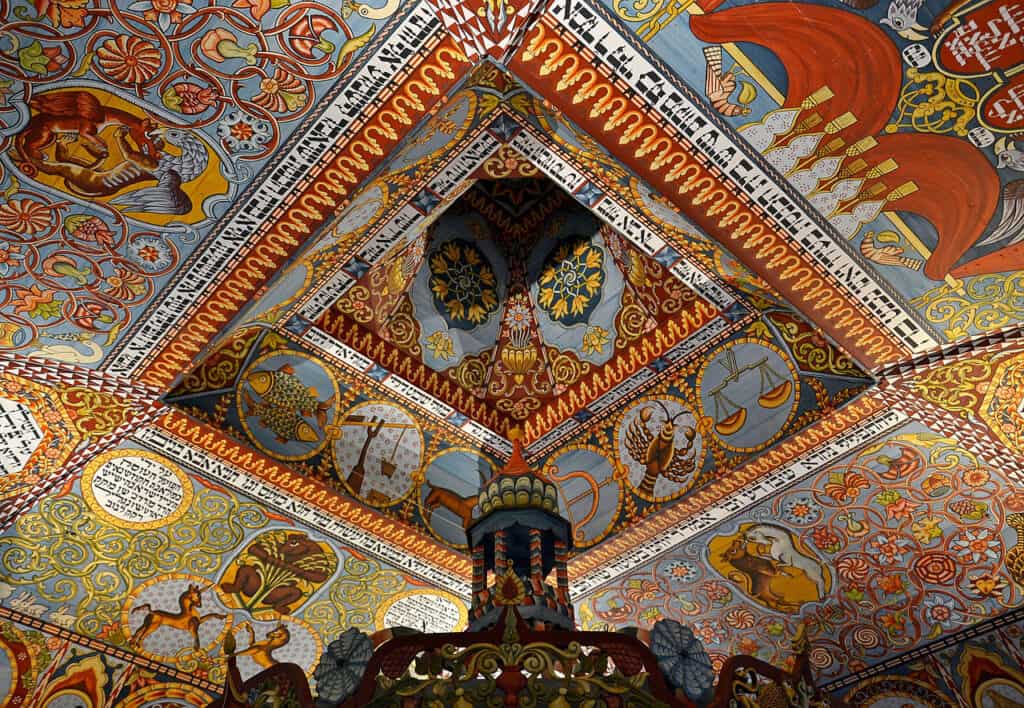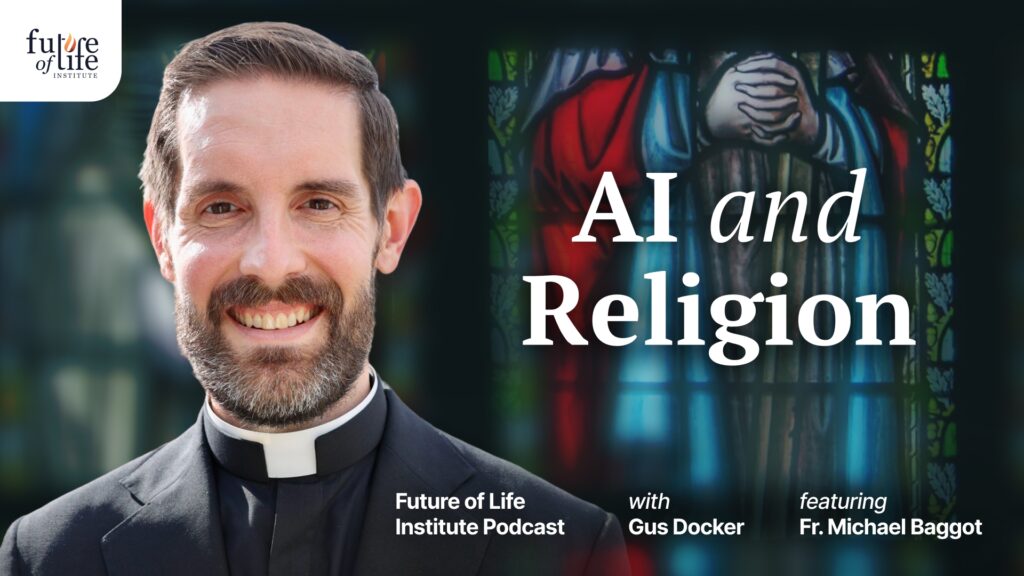A Catholic Vision for a Positive Future with Divine, Human, and Artificial Intelligence

Brian Patrick Green, Ph.D., is the Director of Technology Ethics at the Markkula Center for Applied Ethics at Santa Clara University, USA. He is author of the book Space Ethics, contributing author to Encountering Artificial Intelligence: Ethical and Anthropological Investigations, and co-author of Ethics in the Age of Disruptive Technologies: An Operational Roadmap (The ITEC Handbook) and the Ethics in Technology Practice corporate tech ethics resources. He has worked extensively with the Vatican, the World Economic Forum, and many technology companies on AI ethics. Green is a member of the Future of Life Institute’s AI Safety Community Researchers.
The Bible contains two great commandments: love God and love neighbor (Matt. 22:37-40). This makes sense given that God is love (1 John 4:16) and humans are made in the image and likeness of God (Gen. 1:26-27), meaning that we are, in some sense, love as well. We can only truly be ourselves if we love others and are loved in return.
However, God is not merely love. In the first chapter of John’s Gospel, we learn that God, in the form of the second person of the Trinity, Jesus, is also Logos – most often translated as Word, but including (and variously emphasized as) logic, reason, and rational discourse. Because God’s essence is existence, God is the one coherent act of being itself, Exodus’s “I-Am-Who-I-Am” (Exo. 3:14) – pure existence – and any falling away from God is also a falling away from being and towards non-existence. To love God, then, is to will to stay alive, to exist. And to love neighbor is to exercise those practices necessary to maintain life, existence, on Earth: the precondition for loving God. The logic of God is love, and the love of God is logic.
This yields two further ethical rules of Christianity: The Golden Rule – “Do unto others as you would have them do unto you” (Matt. 7:12, Luke 6:31) – and the most fearsome and avoided Christian command of all: “love your enemies” (Matt. 5:44). How can such reckless love exist in this world?
If God is love, good, and rational, then the opposite of God is hate, evil, and the irrational. God is being itself, and evil is irrational because it rejects being: it is self-destructive. Evil undercuts its own existence, but not only to itself: evil is death-spreading, metastasizing to take bystanders and innocent people down with it, as many as it can grasp, before it falls into nothingness. Evil is 0 to God’s 1. Thus, God’s great commandments are God telling us how to avoid evil and stay alive. More than that, through love we also learn to flourish, and create a flourishing world. To miss the mark is the path towards death, but to approach the mark is to draw nearer to God: the path towards life (Deut. 30:19, Didache Ch. 1).
The above reflects the Triune God’s Divine Intelligence. A human who desired wisdom above that of mere mortals might be advised to try to figure it out.
And an artificial intelligence might also be advised to “go and do likewise” (Luke 10:37).
How might we make AI, then, that shows love of God and neighbor, walks with us on the path towards life, and acts as a blessing to the world rather than a curse?
Perspectives of Traditional Religions on Positive AI Futures
An introduction to our work to support the perspectives of traditional religions on human futures with AI.
First, ethical guidance should move from abstract to concrete. Truth is a paramount value witnessing both logic and love. Human short- and long-term survival are also paramount values related to God’s nature as both love and existence itself: “I am.” And living in a functioning society now and long-term are expresses God’s Trinitarian and relational nature. Love requires human survival, love requires relationships as foundations for society, love requires truth, and the same goes for reason: reason requires life, society, and truth. In fact, these values – survival, sustainability, sociality, education, and truth-seeking – are logically demonstrable by reductio ad absurdum specifically because to deny them is to deny the foundations of reason itself. This is secular philosophy, not theology – God has nothing to do with the proof, except to create a universe where logical proofs are possible. A rational universe expresses and reflects the mind of its rational creator, and both can in turn be examined by rational human minds.
The above five values can be made even more concrete by relating them to more immediate sets of moral values, such as the United Nations Sustainable Development Goals, the UN Universal Declaration of Human Rights, and even tech companies’ AI ethics principles: all can fit into these five values. These five values were also stated by St. Thomas Aquinas in his Summa Theologiae, in the 13th century, again, not as a theological assertion, but rather as the bare bones of a universal “natural law” ethics based on human nature (Aquinas ST I-II 94.2). In fact, natural law ethics evolved into human rights discourse over time.1
All of this is to say that a positive AI future will exhibit machines that work to protect our immediate survival, promote our sustainable and long-term survival as a species, help us to live in a free and just society, become educated and skilled to the best of our abilities, and seek and represent the truth in all its beauty. At the same time, AI should also be used to mitigate risks to human extinction, monitor and limit unsustainable activities, reduce or redirect positively the worst antisocial behaviors, limit actions that would harm education, and reduce mis- and disinformation.
A positive future should also have a balance between firm ethical rules and respect for individual conscience and freedom. Alongside the UN SDGs, the UN UDHR, and various corporate ethics principles, nesting under the five broad value-themes above, there are various lists of Catholic principles relevant to social ethics and technology ethics.2345 These lists of principles all differ, showing how the Catholic tradition diverges as it becomes ever more specific. The Catholic Church lives with that tension. The Church justifies such moral diversity by emphasizing that natural law ethics has both invariable general (abstract) principles and legitimately varying specific (concrete) principles (Aquinas ST I-II 94.4). The official Church teaching on the primacy of conscience adds to this tension: respect for human persons requires respect for their differences in opinion, therefore even an individual’s misguided (from the Church’s perspective) conscience should be respected (Aquinas, ST I-II 19.5).
With regards to AI, this means that AI ought to be designed to respect human freedom of speech, freedom of religion, and other important freedoms, but with the constant awareness that objective moral truths do exist and also must be respected. Therefore, although one might, e.g., freely assert ideas contrary to the value of humankind’s survival, society can and should legitimately limit associated actions.
This presents a bit of a quandary for AI, because some believe that we should reduce the speed of AI development, while others believe we should accelerate, both believing that their path will do more to ensure humankind’s survival. Which view is correct is unclear, though we – humankind, or rather several small groups of humans – are running the experiment (notably without a control group) and time will tell who is right. The Catholic Church has not presented a direct opinion on this matter yet, other than to say that the Church should “above all protect mankind from self-destruction” (Laudato Si 79 and Caritas in Veritate 51) – a firm stance in favor of caution.
Ethics is the path from the present to the future, and the choices and actions that may lead to better and worse outcomes – and make us better or worse people. As children of God, commanded to love, seeking a better future is our mandate. Christ brought the Kingdom of God to Earth, to be ruled by the meek and those who love their enemies. Such a strange utopia is perhaps unimaginable, yet still worth thinking about. Utopias are a lost art form; the original Utopia was written by the Catholic Saint Thomas More, martyred by Henry VIII of England. But recently, utopias are starting to make a comeback (hopefully without the martyrdom). The Future of Life Institute’s Futures project aims, at least in part, to help revivify the lost utopian genre. As a Catholic, I wholeheartedly approve.
AI is a technology with immense promise to help the world – and also the promise to realize our worst nightmares, as humankind all-too-predictably directs it towards evil. In other words, as we have had throughout history, though now with the highest-ever stakes, we have set before us “life and death, blessings and curses” (Deut. 30:19). We should choose life so that we and our children may live.
References
↩ 1 Brian Tierney, The Idea of Natural Rights: Studies on Natural Rights, Natural Law, and Church Law 1150-1625 (Grand Rapids, MI: Eerdmans, 1997).
↩ 2 AI Research Group of the Centre for Digital Culture, Encountering Artificial Intelligence: Ethical and Anthropological Investigations, Vol. 1, Issue Theological Investigations of AI, December 14, 2023, p. 3. https://jmt.scholasticahq.com/article/91230-encountering-artificial-intelligence-ethical-and-anthropological-investigations
↩ 3 US Conference of Catholic Bishops, “Seven Themes of Catholic Social Teaching,” Office of Justice, Peace & Human Development, drawn from Sharing Catholic Social Teaching: Challenges and Directions (Washington, DC: USCCB, 1998) and Faithful Citizenship: A Catholic Call to Political Responsibility (Washington, DC: USCCB, 2003). https://www.usccb.org/beliefs-and-teachings/what-we-believe/catholic-social-teaching/seven-themes-of-catholic-social-teaching
↩ 4 Canadian Catholic Organization for Development and Peace, “10 Principles of Catholic Social Teaching,” devp.org, 2020. https://stmikes.utoronto.ca/wp-content/uploads/2020/07/180-Catholic-Teaching-v2.pdf
↩ 5 Christopher Kaczor, “Seven Principles of Catholic Social Teaching,” Catholic Answers, April 1, 2007. https://www.catholic.com/magazine/print-edition/seven-principles-of-catholic-social-teaching
About the Future of Life Institute
The Future of Life Institute (FLI) is a global think tank with a team of 20+ full-time staff operating across the US and Europe. FLI has been working to steer the development of transformative technologies towards benefitting life and away from extreme large-scale risks since its founding in 2014. Find out more about our mission or explore our work.
Related content
Other posts about Religion

A Buddhist Perspective on AI: Cultivating freedom of attention and true diversity in an AI future

The Future and the Artificial: An Islamic Perspective


